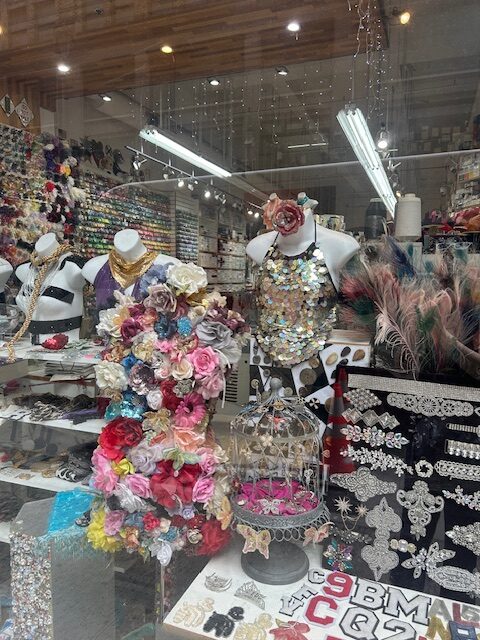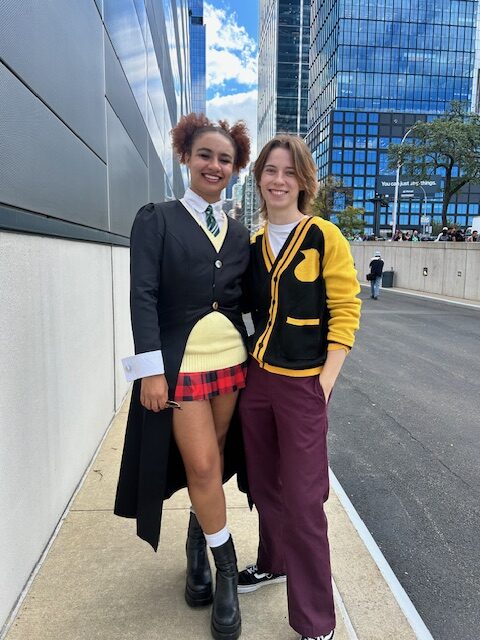Two days after the earthquake leveled Port-au-Prince a mother scoured a makeshift morgue desperate to locate her four children who died when her house caved in. Families scanned thousands of bodies stacked on the streets hopelessly trying to identify their loved ones. Machines scooped up corpses and dumped them into bins like garbage, limp limbs flailing everywhere, and hauled them to mass grave sites.
It was sheer devastation, and USA Today national reporter Marisol Bello witnessed it all.
As the newspaper’s disaster reporter, Bello, 38, has covered numerous national catastrophes, including 9/11, but she said nothing compared to Haiti.
“It was the singular most amazing story I have ever covered,” she said to a group of New York University journalism students on Feb. 9.
Her nine-day stint in Haiti proved to be a profoundly emotional endeavor.
Bello was embedded with the relief organization World Vision, which was immediately dispatched to one of Haiti’s largest hospitals. On the way to her post, she saw a succession of collapsed buildings. The closer she got to the rubble, the more mutilated bodies she saw.
“As we got into downtown the bodies started piling up,” Bello said. “Then you start seeing rows. Closer to the hospital the entire streets were lined with bodies. At that point they were not covered because it just happened. They were just there and they began to bloat.”
She said the injured, barely-alive victims lingered right next to the dead. Most were bleeding badly and the smell was unbearable.
“It was a putrid-smelling, visually-shocking thing to see,” she said. “Mingled in all the dead bodies are all the injured people desperate for care. Everybody was in an unbelievable collective state of shock.”
Later Bello headed away from cacophony in the streets and into what was left of a nursing school where it was “eerily quiet.”
Bello said she immediately came across a twisted woman with a black skirt hiked up past her legs, but she couldn’t bring herself to look at her face. She backed away from the flattened building, which was really a big pile of rubble, and experienced a “very personal moment.”
Bello confessed that it still haunts her.
There was no shortage of stories in Haiti, and Bello said she focused on how to best tell those stories. She didn’t allow herself to process the horror until she had quiet, private moments.
That’s when she “got really choked up and really emotional.”
Most of the time, though, Bello put aside her feelings and concentrated on the storytelling. She said the logistics on the ground made the reporting process extremely difficult.
Bello didn’t speak Creole or French. Her cell phone didn’t work. She wrote many of her dispatches on her Blackberry. She stayed in a bordello with no electricity. She only had $800, which she admitted was not nearly enough to last nine days. She arrived with nothing more than a few pieces of electronic equipment — a satellite phone, laptop and video camera — and the clothes on her back.
Bello experienced the severe aftershock that struck a week after she arrived in Haiti.
It was early. Bello was asleep in her hotel room when she felt rumbling. She bolted for the door and tried to open it, but it was stuck. She said she could hear a security guard frantically scream at people to run. Before she escaped, she feared she was going to be one more mangled body lost in the enormity of the disaster. She described it as “sheer panic.”
Despite her absorption in the horror, Bello said she had no interest in becoming part of the story like some journalists, namely CNN anchors Anderson Cooper and Sanjay Gupta who helped rescue children and perform surgery, respectively.
“I just feel like we should never be part of the story,” Bello said. “In this way I can be old-school. If you want to be an actor in that and if you need to be an advocate or aid worker, do that so then you get interviewed.”
Bello began her reporting career 17 years ago and worked in Dayton, Philadelphia, Pittsburgh and Detroit before moving to Washington, D.C., three years ago.
Bello is an experienced beat reporter having covered Detroit city hall and currently specializing in national civil rights issues. While she enjoys being a so-called expert in certain areas, Bello said nothing compares to being a general assignment reporter especially when it comes to stories like the Haiti earthquake.
She said the best part is getting to experience “amazing, fascinating places” and to be “a witness to history.”
Bello’s talk inspired the future journalists.
“It convinced me that urban reporting is the most fundamental form of journalism,” said Darren Tobia, whose beat is Jersey City. “The same skills she uses in covering disasters, she acquired as a metro reporter in Philadelphia and Detroit.”
Student Simon McCormack took to Bello’s softer side.
“She is simultaneously a hardened news reporter and a deeply empathetic human being,” said McCormack. “That’s a rare mix in the news business.”



Comments
Great profile, Liz. Congrats.
I can not agree with you in 100% regarding some thoughts, but you’ve got an interesting point of view.
Wow. That sounds really intense. Great job, Liz!
Good profile, Liz. Two things struck me: the first is that Marisol, like other first responders, is always on the scene shortly after the disaster (be it local, like Detroit, or national, like Katrina,or international like Haiti) and is such an important part of what just happened and what happens next.
The second thing that hits me is the part about journalists not being part of the story – I couldn’t agree with that more. Unless you are Hunter S. Thompson and have something about you that is integral to the bigger picture, stay out of the story.
Hi, I applaud your blog for informing people, very interesting article, keep up it coming
Excellent! If I could write like this I would be well happpy. The more I read articles of such quality as this (which is rare), the more I think there could be a future for the Net. Keep it up, as it were.
Haiti Earthquake Sympathy to the victims
The great work